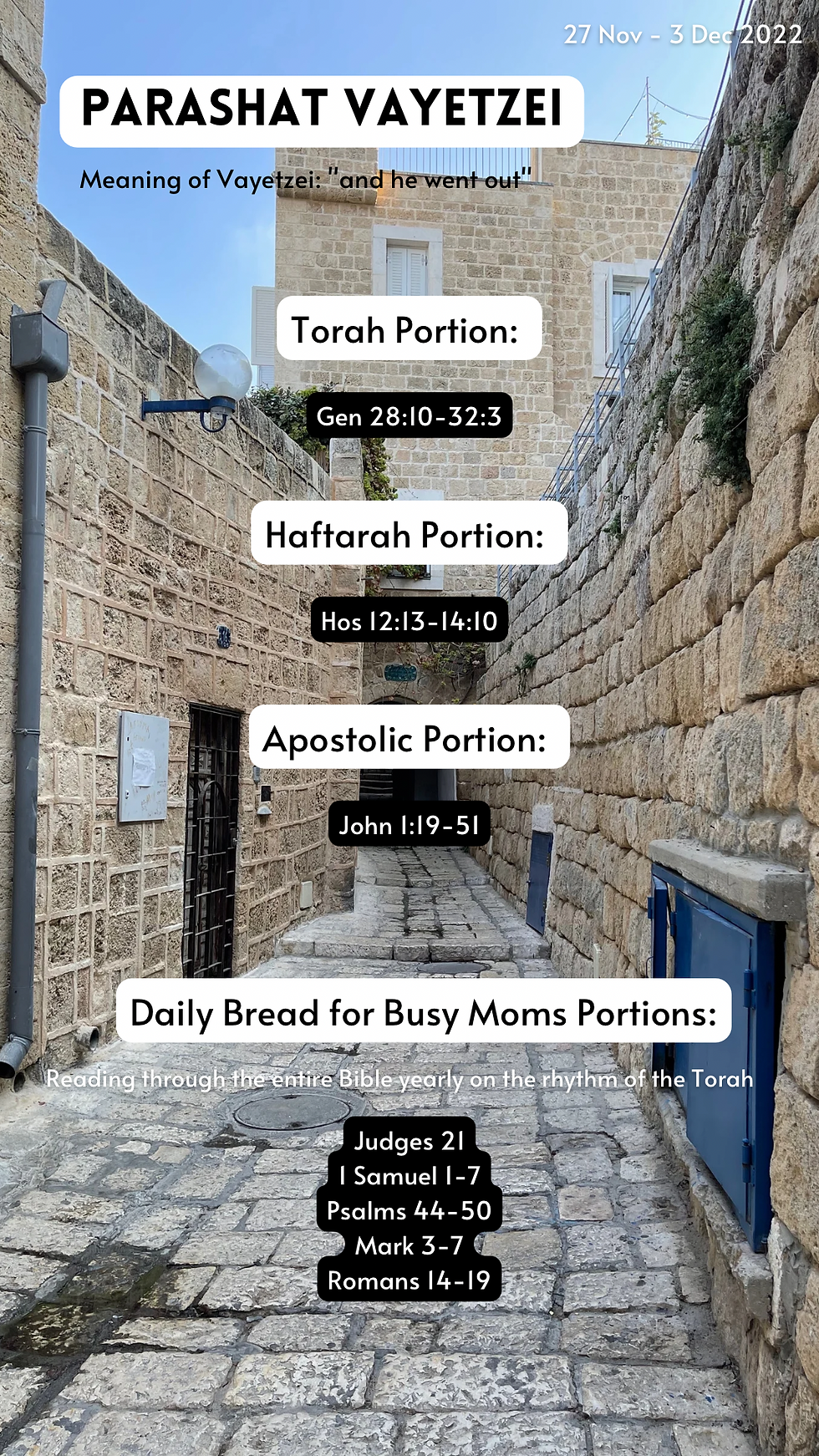Parashat Vayetzei
- Renché Seyffert
- Dec 4, 2022
- 4 min read
Updated: Jan 6
7th Portion [1-7 Dec 2024]
Theme of the Book of Genesis:
Desire for life, to choose life and to create!
Meaning of "vayetzei" = "and he went out"
This week's Torah portions:
Sunday: Genesis 28:10-22
Monday: Genesis 29:1-17
Tuesday: Genesis 29:18-30:13
Wednesday: Genesis 30:14-27
Thursday: Genesis 30:28-31:16
Friday: Genesis 31:17-42
Shabbat: Genesis 31:43- 32:3 & Hosea 12:13-14:10
Apostolic Writings:
John 1:19-51
In this parashat (portion) we read about Jacob, who goes on his way to Laban - his mother's brother - to find a wife for himself. On his journey there, he has this dream about the ladder (the famous Jacob's Ladder story we all know). God gave Jacob the same promise that He gave to Abraham, and interestingly enough - the place where Jacob had the dream wasn't far from the place where God gave the promise to Abraham.
Jacob stayed for 20 years with Laban. Laban had two daughters; Leah the eldest & Rachel the youngest. Jacob loved Rachel and worked for 7 years for Laban to get to marry her (after staying with Laban for 20 years). When the 7 years was over, Laban deceived Jacob and gave him Leah instead. Jacob then worked another 7 years to also get to marry Rachel, the one he loved. In this portion, we read that Leah gave Jabob several children but Rachel remained barren. We also read about the kids that Jacob had with both Leah and Rachel's maidservants and eventually Rachel fell pregnant and gave birth to Joseph (and Benjamin but not in this portion). Jacob ended up staying with Laban for 40 years all together and he wanted to move back to his home town, so that he could gather an inheritance of his own for his offspring.
Laban knew that Jacob was blessed due to him having the firstborn blessing (which Jacob received from Isaac). Therefore, Laban didn't want Jacob to leave and take the blessing with him. In an attempt to prevent Jacob from leaving, Laban continually changed the agreement between himself and Jacob with regards to how the flock would be divided. Finally when they came to agreement, Jacob left and continued to prosper. We read about a new beginning of fruitfulness, just like when Abraham moved away and had Isaac.
Abba's heart for His children are to be fruitful! Not only in a physical sense with a fleshly offspring but also to experience fruitfulness in all aspects of life!
The theme of this portion is about understanding the concept of fruitfulness. When Abba gives us a promise, He will fulfil it! Being fruitful is about taking up our anointing as kings, priests and prophets and living in that anointing. As a result we will see the fruitfulness come to life!
This portion is our reminder that promises brings something forward, it always has a blessing in store. We have to purposely step into our callings based on the promises we have received. As a result, fruitfulness will come. Thanks to the covenant we are in with Yeshua, we should never see ourselves as barren - in any area of life. Just like Jacob had to go and find a wife an Rachel had to wait to fall pregnant, in the same way we need to take up our responsibility and KNOW that God will fulfil His promise to us! Faith is not passive!
Jacob's journey was simply the beginning of the fruitfulness that continued to take place afterwards. From that seemingly small start, the tribes of Israel were born!
We need to live from a place of fullness - not from ourselves - but from a place of the promises which God has spoken over us!
Jacob's ladder is a symbol of a bridge between man and God. Through Yeshua (Jesus) we know that we have the Way to God - we are the spiritual fruitfulness of Yeshua!
We need to ask ourselves what we can do to add to this spiritual fruitfulness. How can we add to the Kingdom of God? We are called to make disciples and be fishers of men. Are we doing that? Is my life fruitful? Am I making disciples?
If you are new here, you can follow the Torah portions with us every week!
(Simply click on the one you want to read)
Portion 7: Vayetzei (This blog you are reading now)

Comments